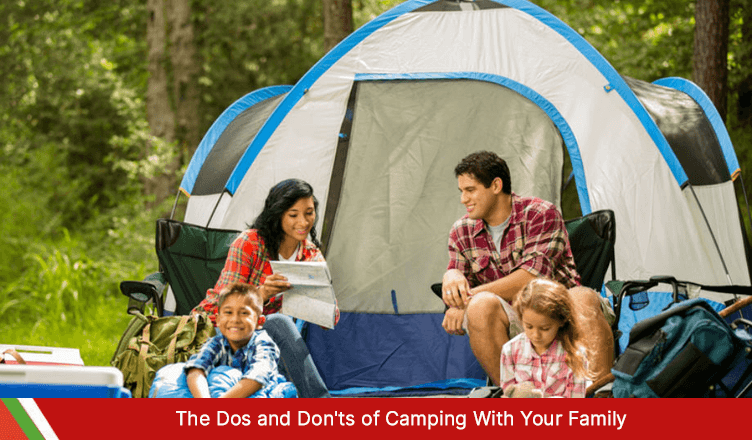The complete monitoring experience for your phone
Get XNSPY and start tracking calls, texts, multimedia, locations and more on any phone!
Get Started Now Live DemoCamping is a great way to spend quality time with Mother nature but there’s always a chance for things to go wrong! You can get off on the wrong foot and ruin your trip before it even begins, and most of the time, it’s the smallest of errors that can spoil an otherwise perfect camping trip.
To ensure camping safety without compromising the enjoyment factor, I’ve decided to share what I learned from my camping trips. There are a few dangers that come with camping that you should be aware of and take precautions against.
If you want to know how to stay safe while camping, continue reading because this article talks about safety camping tips that you can use to ensure a smooth camping experience.
#1. Do Your Research
Research is essential but it is especially important when planning a camping trip. Just a few minutes of online research can mean the difference between a safe camping trip and a chaotic one.
You should look into great camping spots you can easily access while hiking. Investigate the trail, local weather, food options, emergency services, and bring camp safety equipment. It is one of the most straightforward tips on how to stay safe while camping.
You will also need to research the equipment required by reading customer reviews. Depending on the camping trip, you may require more than just tents and sleeping bags.
You might need a water heater such as the Ecosmart ECO MINI if you go on a multi-day trip through the Swiss Alps, for example. But If you’re going on a safe camping trip in developed campgrounds, you may only need the bare necessities.
#2. Beware Of Animals – Clean Up After Yourself
Food should never be left unattended. Clean up your campsite before heading out for the day or retiring for the night. Follow posted signs or ask the camp ranger or campsite attendant about basic camping safety protocols in place and food safety to avoid unwanted animal encounters.
Some campgrounds have bear lockers where you can store your food to reduce your carbon footprint. You also avoid the attention of hungry animals scavenging for food in the wilderness.
This is especially important when camping with children because, as we know, they can be messy and leave unfinished snacks and candy laying around, attracting wild animals. So dispose of food properly when you are about to leave or go to sleep, as you don’t want animals rummaging through your food supply.
#3. Be Cautious When Setting Up A Camp Fire
No camping trip is complete without setting up a campfire, cooking smores on it, telling scary stories while gathered around it, or someone playing their favorite campfire songs. Campfires are also important for keeping warm or preparing food outside during chilly nights.
So it is vital to practice extreme caution when handling fire. Maintain a distance of at least 15 feet from trees, shrubs, and bushes, so they don’t accidentally catch fire. And always keep a bucket of water near you and put out the fire before going to sleep or leaving the campsite. You should be even more vigilant around campfires when camping with children.
#4. Always Be Prepared
When planning a camping trip, it’s critical to be prepared for the worst. Pack a first-aid kit with fever medication, pain relievers, allergy medication, bandages, and plasters. First aid kits are required on every camping trip and should not be overlooked. If you’re camping with family, consult the campsite website and read their camping safety tips for parents and children.
Other essentials include soap, toothpaste, warm and cool clothing, a camping tent, sleeping bags, and camp safety equipment such as an Orion flare gun. You will always be prepared for any unforeseen circumstances that may interfere with your camping experience if you do this.
#5. Heed All Warning Signs
It’s easy to get caught up in the excitement of all the enthralling camping adventures you’ve planned for yourself and your family. Some examples of such recreational activities include fishing, swimming, hiking, and boating for your trip.
And you might be an expert at the various activities available at the campground, but that doesn’t mean you shouldn’t pay attention to the warning signs. If there are kids with you on the camping trip, it is important to go over safety rules for kids with them. In fact, do it multiple times because practice makes perfect.
You should always heed warning signs or safety advice given by locals. If a sign instructs you to avoid a restricted area or prohibits you from swimming or diving in certain areas, you should always follow it. Because the locals are familiar with the area and more knowledgeable than you so always heed their warnings and safety rules for kids.
#6. Always Share Your Camping Trip Details
The last thing you want to do when planning a camping trip is not to share the plans with your friends and family. It’s important to let your loved ones know about the details of your camping trip, especially if you’re camping in the wild.
There can be a lot of unnecessary stress and panic, particularly if you haven’t been in touch for a while. To avoid this, you can utilize a geolocation tracking app that automatically shares your real-time location with the people you care about.
I recommend using XNSPY. It uses a target device’s geolocation service to determine its location. Simply install the app on your smartphone, and it will remotely share the phone’s real-time location data with your friends and family.
That allows them to keep a check on you and if anything does go wrong, provide your exact location to the emergency services.
#7. Keep A Portable Charger With You
When you’re going camping, it is obvious that you won’t have any place to plug your charger in. And you’re quite likely to run out of battery during your trip. So don’t take any chances and keep a portable charger with you.
After all, you don’t want to miss out on any memorable moments to capture. Many campsites offer electric pitches and phone charging facilities, but having a portable option while you’re away from the campsite can be useful.
I recommend the Belkin power bank because it is built like a tank and has a huge battery so it can charge several times before needing to charge itself.
Safety Camping Tips Will Improve Your Camping Experience
So there you have it. All of these suggestions are the result of practical experience gained from several camping trips. And they should serve as a good starting point for your next camping trip.


